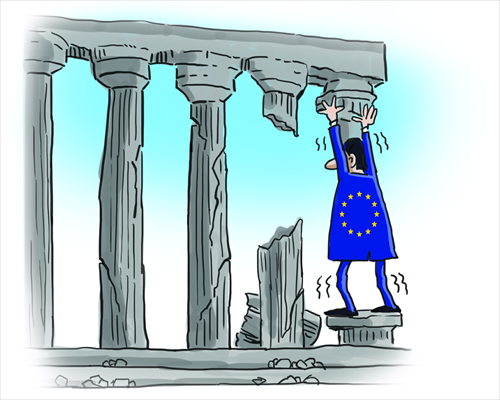National divides leave European ideal tattered as countries butt heads

Illustration: Liu Rui/GT
The first months of 2015 have not been ideal for the project of European integration. Although the eurozone debt crisis seems to be more manageable than at any time since September 2012 due to the decisive action of the European Central Bank, recent developments constitute a setback. In particular, negotiations between the new Greek government and its European partners on the prolongation of the bailout program are marked by a continuous aggressive tone, making it hard to predict future developments.
It is true that all European politicians involved in discussions attempt to downplay fears of a potential "Grexit," a withdrawal of Greece from the eurozone. German Chancellor Angela Merkel, for example, said at a press conference after her meeting with Japanese Prime Minister Shinzo Abe that the political objective of the EU has been for years to keep the country in the common currency.
On the same wavelength, President of the European Commission Jean-Claude Juncker excluded any "Grexit" possibility in an interview he recently gave in the Sunday edition of Die Welt.
These statements certainly represent the will of Europe to prevent a breakup of the euro system. But deeds are often more difficult than words. International commentators tend to analyze the problem through a pure economic perspective. They argue, correctly, that Greece will, sooner or later, agree on measures advocated by its creditors because it would otherwise encounter the danger of a default.
The situation is now, however, more complex for Europe. Apart from numbers and economics themselves, attention should be also turned to the existing lack of confidence. Most, if not all eurozone countries, do not trust the new Greek government. They are skeptical and predict it will not successfully keep its promises in implementing structural reforms. And, they publicly express this view in a straightforward and sometimes arrogant way. A recent German survey is indicative; 71 percent of respondents doubted that progress will be shown.
More importantly, the media not only in Germany but also in other European states often includes references to a possible "Grexit." The media are keen on developing dramatic scenarios to create panic. The German tabloid Bild, for instance, has published an editorial in Greek encouraging Greece to return to its national currency.
On the other hand, the Greek government responds by continuously publicly attacking the creditors of the country, criticizing the role of Germany and ignoring its own responsibility. It plays the victim, portraying Greece is allegedly the target of a cruel policy stemming by Berlin's motivation to politically dominate in Europe. Within this context, it attempts to demonstrate that by sticking to its guns it can bring back the lost national dignity of Greek citizens.
What is even more problematic than these misunderstandings is the lack of vision for the future of Europe. Eurozone states lending money to Greece repeat cynically that they are very generous in supporting the country and link the provision of financial assistance to austerity and reforms. Foreign Minister of Spain José Manuel García-Margallo, for instance, did not hesitate to say that Spain could have increased pensions by 38 percent at the national level if it had not helped Greece.
From its part, Greece sees no solidarity from its partners but a systematic attempt to offend the country's authorities and people.
As long as the European frame is absent from discussions, national stereotypes will be created and reproduced. This is highly risky for the project of European integration which is not only connected to the common currency. Differences on economic objectives as well as political motivations should not jeopardize the common European orientation and tradition.
Ironically, Spain and Greece, despite similar problems, are currently at odds. The rise of Podemos in the former, which could benefit by a potential success of Syriza at the European level, is leading Prime Minister Mariano Rajoy to be unusually tough on its positions on the Greek crisis.
Even if an agreement between Greece and its partners will be reached in the next months, the current trauma of the credibility deficit cannot be simultaneously eliminated. For this to happen, many more months will be required. Politicians and journalists who now blame each other in dealing with the Greek crisis will find it hard to cooperate in a harmonious way in its aftermath.
The author is a lecturer at the European Institute in Nice, France. opinion@globaltimes.com.cn